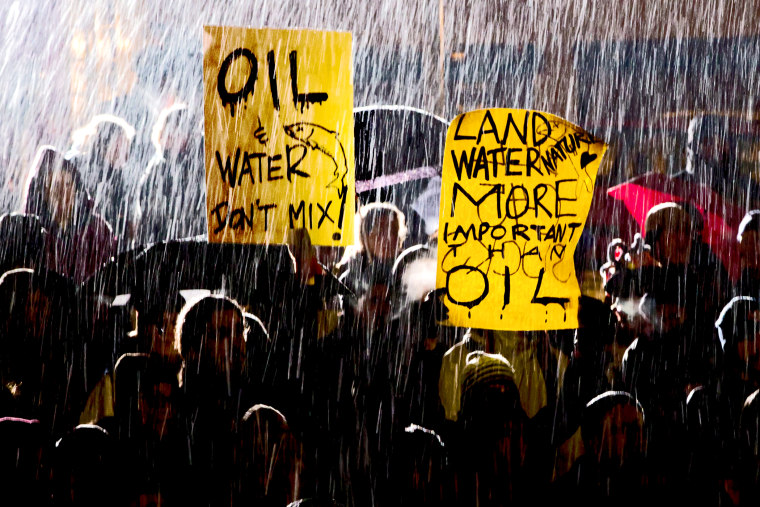A leak in one of the pump stations along Enbridge Energy's Line 67 pipeline caused about 125 barrels to spray across a rural area of Saskatchewan, Canada, the company reported on Saturday. Once Enbridge detected the leak, it promptly shut down the pipeline and dispatched a clean-up crew, according to an official press statement.
"There is no impact to the public, wildlife or waterways," according to the statement. "Enbridge first responders with clean-up and response equipment are on-site, and expect the cleanup to be completed this weekend."
Enbridge spokesperson Graham White told msnbc that the company and Canada's National Energy Board were looking into the case of the week, and that they would be able to determine the cause in "days or weeks." The pipeline currently transports 450,000 barrels of oil per day from Canada to Wisconsin, but Enbridge is currently working to nearly double its capacity, bringing its total daily load to around 800,000 barrels per day. That would bring Line 67 into nearly the same category as the controversial Keystone XL pipeline, which could move as much as 830,000 barrels per day if constructed according to plan.
In fact, Line 67 could be the next Keystone XL in more ways than one. For over a year, environmental groups have been building the campaign against Line 67's expansion.
“We’re very concerned this has flown under the public’s radar,” National Wildlife Federation's Peter LaFontaine told Bloomberg News in May. “The public doesn’t seem to have the same sort of attention for pipeline expansions as they do for pipeline construction. But we’re talking about a lot of crude.”
While Saturday's incident appears relatively minor, that hasn't always been the case with Enbridge Energy's oil spills. In 2010, one of the company's pipelines dumped about one million gallons of crude oil into Michigan's Kalamazoo River, according to the Environmental Protection Agency. That makes it the largest inland oil spill in American history, and Enbridge is still working to clean up the mess. In fact, the company recently missed its deadline to finish dredging the river.
A spill that large may be an outlier, but environmental activists insist that accidents in general are the norm for Enbridge. In a 2012 blog post opposing the Line 67 expansion, Sierra Club accused the company of having "a notoriously poor spill and safety record." The author of the blog post cited a report [PDF] from Canada's progressive Polaris Institute, claiming that the company had accidentally spilled approximately 161,475 barrels of oil between 1999 and 2010.
"We stand behind our record," Enbridge spokesperson Graham White told msnbc. "We have an above average safety record throughout the industry, and we have spent billions of dollars within the past even two years updating the integrity, which is to say the quality, of our pipelines."
The company's quick response to a minor leak demonstrates Enbridge's commitment to safety, he said.
"We're a responsible and responsive company," said White. "We are very good at we do."
